Christians from many denominations and continents gathered on Friday on the hilltop of Pannonhalma Castle. Pope Francis sent a letter of greetings to the participants of the ecumenical symposium, at which all the historic churches were represented within the walls of the Pannonhalma Abbey. The event, entitled "Seek Peace and Follow It!" was addressed by the Ecumenical Patriarch Bartholomew I of Constantinople, and in addition to the conference, the denominations prayed together for peace and for each other in the daily liturgical celebrations of the monastic community. Our Church was represented by Bishop Zoltán Balog of the Danubian Church District, the Ministerial President of the Synod, and Bishop Károly Fekete of the Transtibiscan Church District.
Archabbot Cyril T. Hortobágyi, on behalf of the host monastic community, greeted the ecumenical conference with the words of St. Cyril of Alexandria: "I am filled with joy for the assembly of saints..." He recalled that peace is long and arduous work, a life process, a never-ending effort, because it is vulnerable to our fragile human nature. In the face of human pettiness and vanity, the Holy Spirit calls all people of goodwill to prayer and action for peace. “Today's conference and prayer in the Basilica are a sign to the world: believers in Christ from different denominations and continents are able to speak out, to heal wounds for the peace of the created world," the Archbishop said. “We, the monks of the millenarian monastery, try to fight the angry spirit in our own hearts, following the exhortation of the Apostle Paul, but it is also important to encourage one another by our witness,” he added.
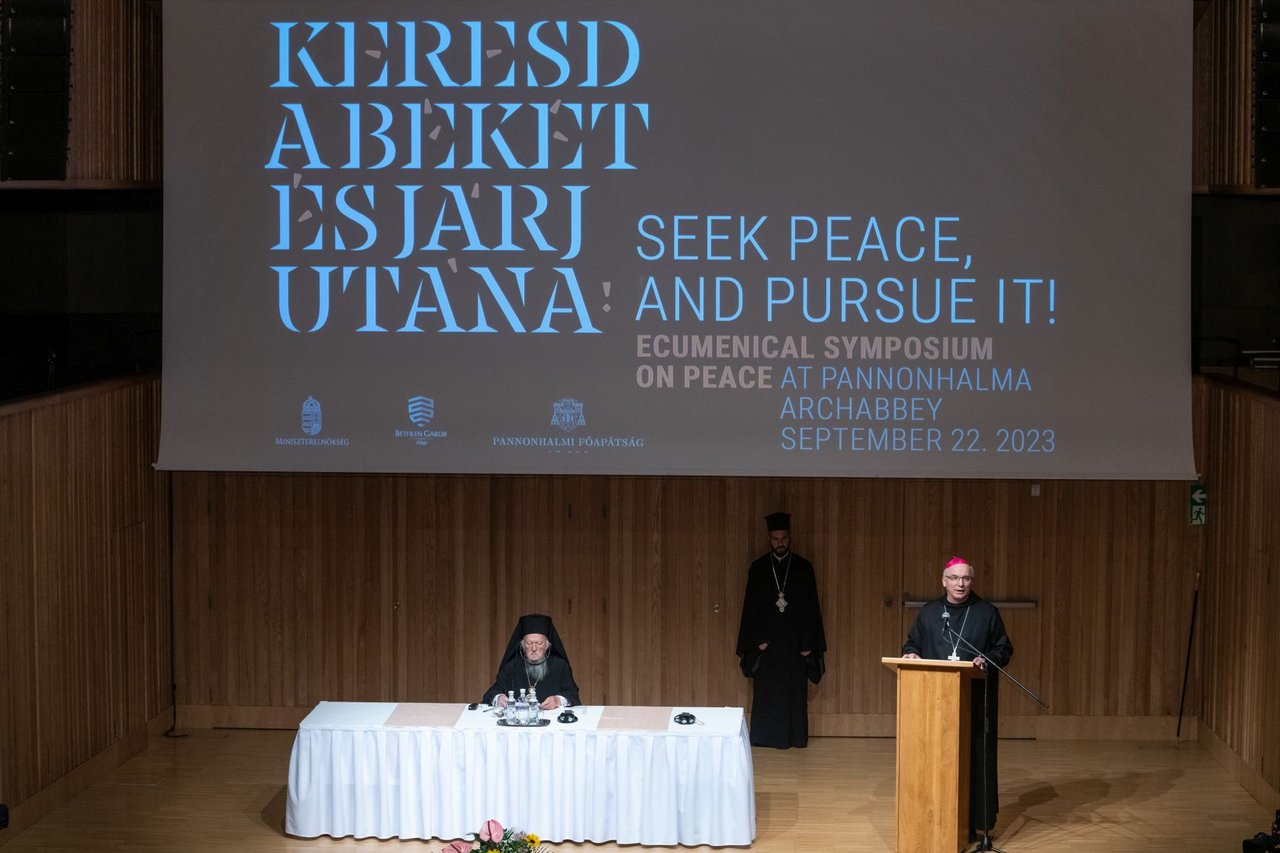
Archabbot Cyril T. Hortobágyi welcomes the participants of the ecumenical conference
Message of the Pope
Michael Wallace Banach, Apostolic Nuncio to Hungary, read out the words of Pope Francis in his letter to the participants of the conference. "St Benedict's vision of peace is not at all a utopia, but a path prepared by God's human love, a path that must be followed step by step by the individual and the community,” he said. Pope Francis called on his listeners to remain on the path of peace: "Let us be messengers and servants of peace where we live and work. But above all: let us pray for peace! The war in Ukraine dramatically calls us to open our eyes and hearts to the nations that suffer because of war, recalling the words of Vatican II: ‘Any act of war which may result in the indiscriminate destruction of whole cities or of vast areas and their populations is a crime against God and man alike, which must be condemned consistently and without hesitation.’" said the head of the Catholic Church in his letter. Finally, trusting in the intercession of St. Benedict, Pope Francis asked the one God of the Trinity to deliver the world from the scourge of war and sent his blessing to the conference.
Experiencing the presence of God is the key
In his lecture, Patriarch Bartholomew I said that Orthodoxy is often accused of being inattentive to society's current problems, ethnocentric, and not accepting modern secularization. At the same time, the Church does not apologise for preaching Jesus Christ and for not evangelising in this world. The Patriarch listed historical efforts when they acted together with the Catholic Church, such as when the Ecumenical Patriarchate and Pope Francis were the first to stress the religious roots of the ecological crisis, characterising it as a consequence of sin and making a joint proposal to change the position. “The ecological crisis and the social crisis go back to the same root. Peace with nature is intertwined with peace among fellow human beings, and both presuppose peace with God. True peace is the presence of God among us. When the experience of it disappears from the world, we subordinate the world to human needs," the Patriarch said, explaining the cause of the crises.
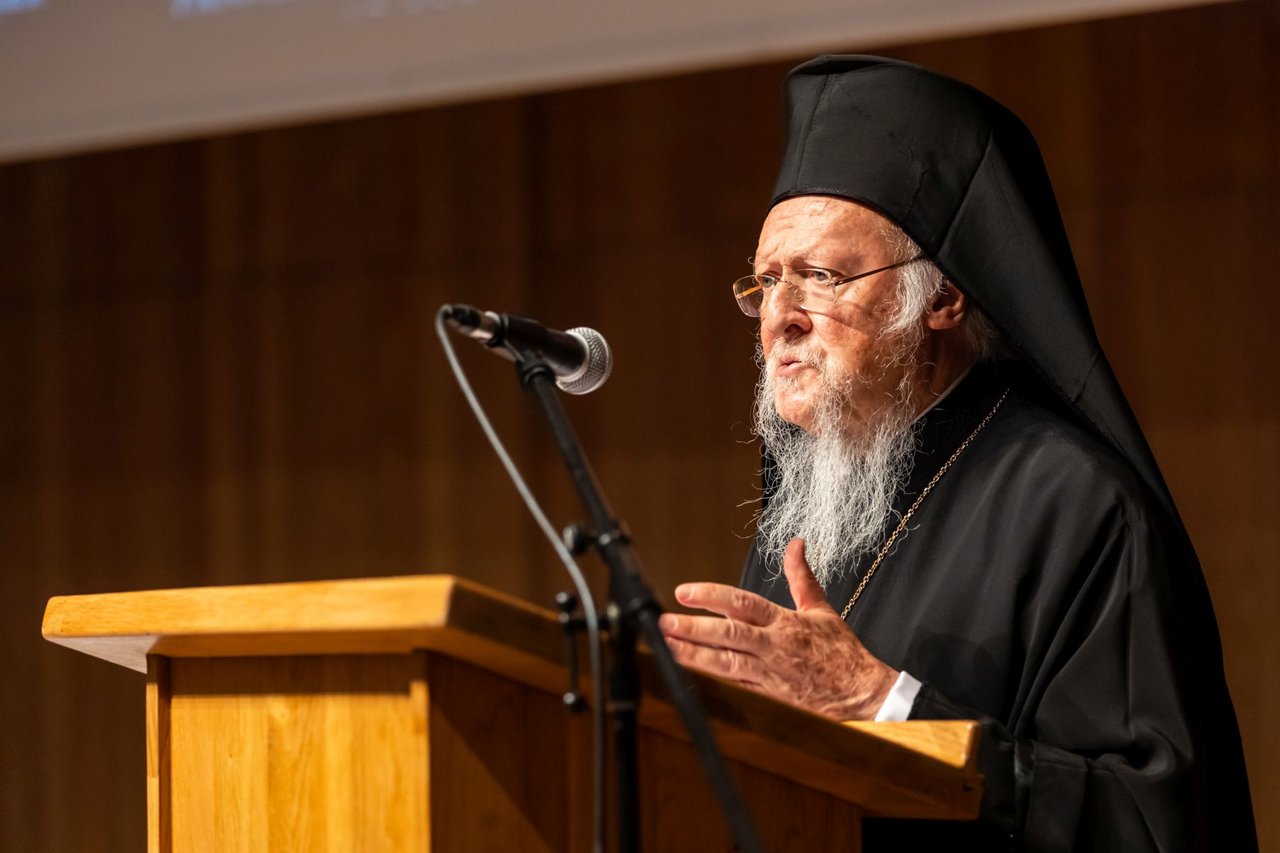
Ecumenical Patriarch Bartholomew I of Constantinople
Cardinal Antoine Kambanda, who himself lost family members in the Rwandan genocide, spoke of how politics has artificially created ethnic divisions and divisions between Hutu and Tutsis, once merely occupational categories. He also described how, in the aftermath of the massacre, the churches came together to serve peace and heal wounds.
The price of reconciliation must be paid
At the conference, Bishop Zoltán Balog, Pastoral President of the Synod of the Reformed Church in Hungary, presented the book Peace, Reconciliation and the Protection of Creation, which summarizes the global initiatives of Patriarch Bartholomew I. He highlighted as an important idea that the price of reconciliation must be paid.
Concerning ecumenical cooperation, Zoltán Balog added that reconciling dogmatic theorems is a futile attempt, but if our faith in Christ unites us, it will be the common source of our social-ethical service. It is a pain that we still cannot be united in the essence, but the pain is a good sign, because it shows that we cannot stop, the Reformed bishop said about the efforts for unity.
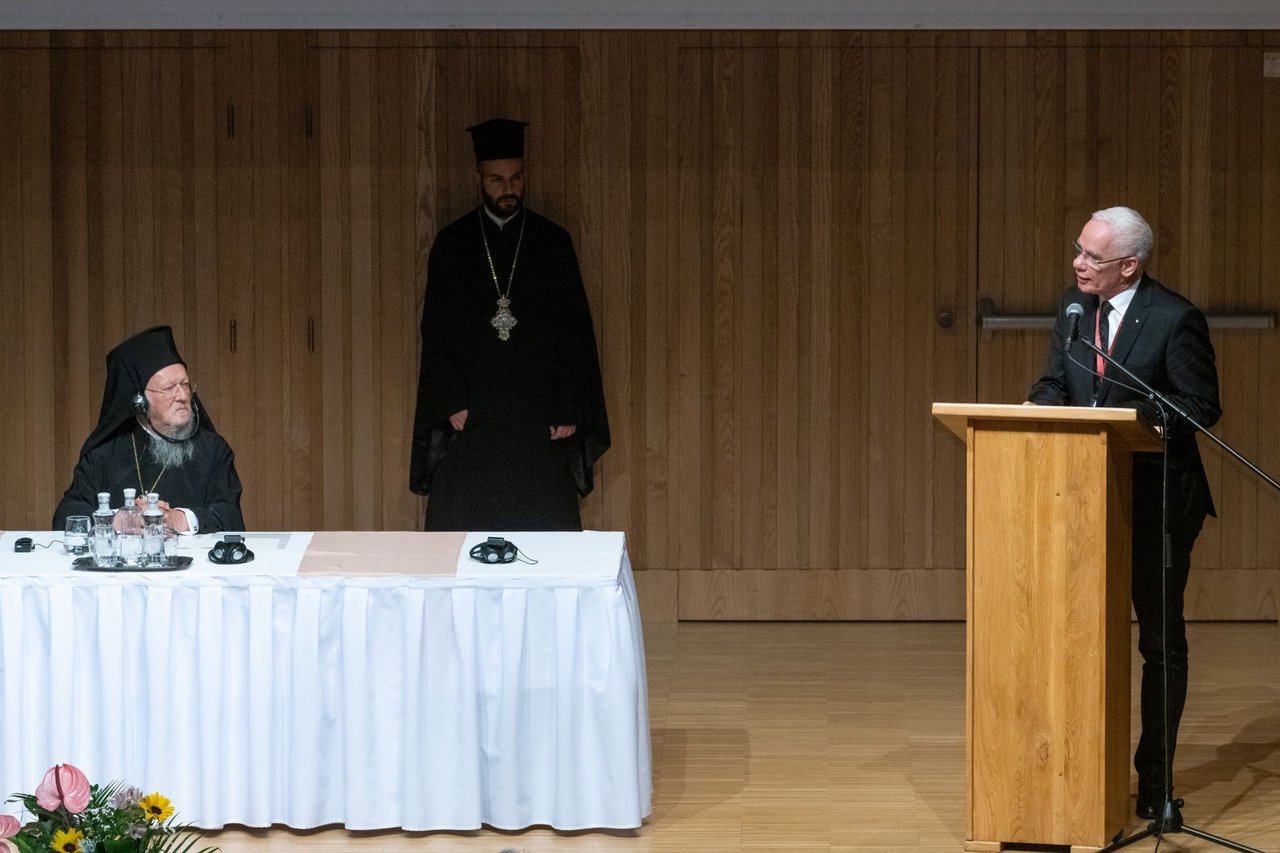
Bishop Zoltán Balog (right) gives a presentation at the ecumenical conference
Referring to the statements in the book, Zoltán Balog said that if we start with truth, we may not reach love, while if we begin with love, we will surely get closer to truth.
The Bishop also reflected on Cardinal Antoine Kambanda's lecture when he said that after the war, we will have the responsibility to help a coexistence in Ukraine similar to Rwanda because the parties will not disappear; they will have to continue living side by side.
Peace given, not as the world gives
András Visky, as Evangelical-Lutheran Bishop Tamás Fabiny called it, gave a "theolpoetic" performance, in which he reflected on peace based on Jesus' half-sentence, "I do not give to you as the world gives." Not just let, give; Jesus’ promise is an unstoppable present time. Let it happen and be endowed with real meaning. It focuses attention on the redemptive act of Jesus," said the writer, who had been working on the sequel to his work, Resettlement, within the walls of the abbey a few months earlier.
Károly Fekete, the Reformed Bishop of the Transtibiscan Church District, spoke on reconciling polarized groups at the cross-table discussion: “We tend to play on the divisions and further widen the distance between us. What I miss most is an honest voice. We used to talk about reconciliation and forgiveness, but today we have not talked about apology, which would mean that I also have a responsibility in the discord," he pointed out.
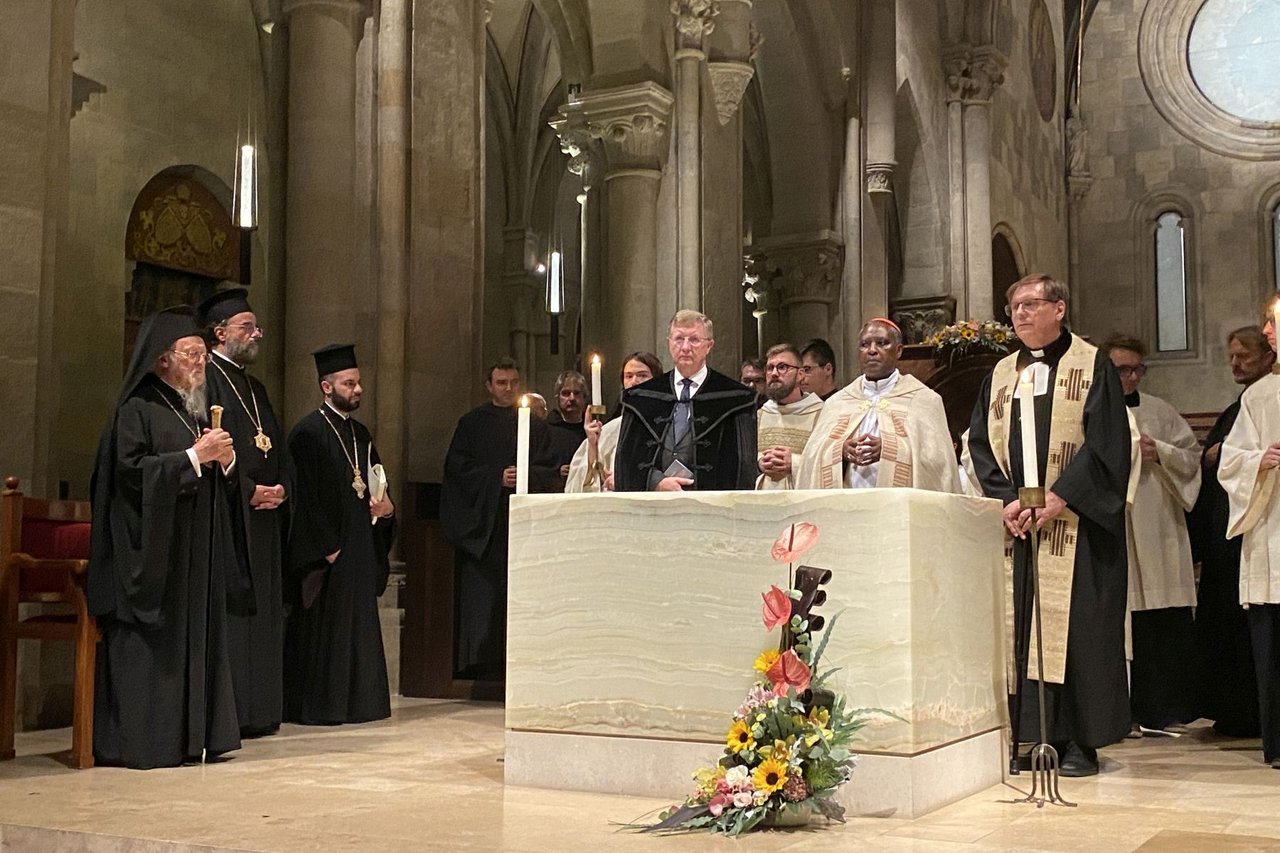
Representatives of different denominations prayed together for each other and for peace
Károly Fekete cited the case of the death of a journalist's wife in the 2015 Paris terrorist attack as an example. Afterwards, the journalist started writing letters under the title "You Will Not Have My Hate.” He vowed to teach his young son that hate is not a way: 'You wanted me to be afraid, to sacrifice my freedom for my safety. You did not win.’ “This attitude is an example for Christians. Let us pursue the deeds of life, not the culture of death!” said Charles Black.
Finally, at the end of the prayerful communion and prayer for unity between the confessions, Patriarch Bartholomew I preached the Word, and Antione Kambanda led the Benedictine monks in vespers.
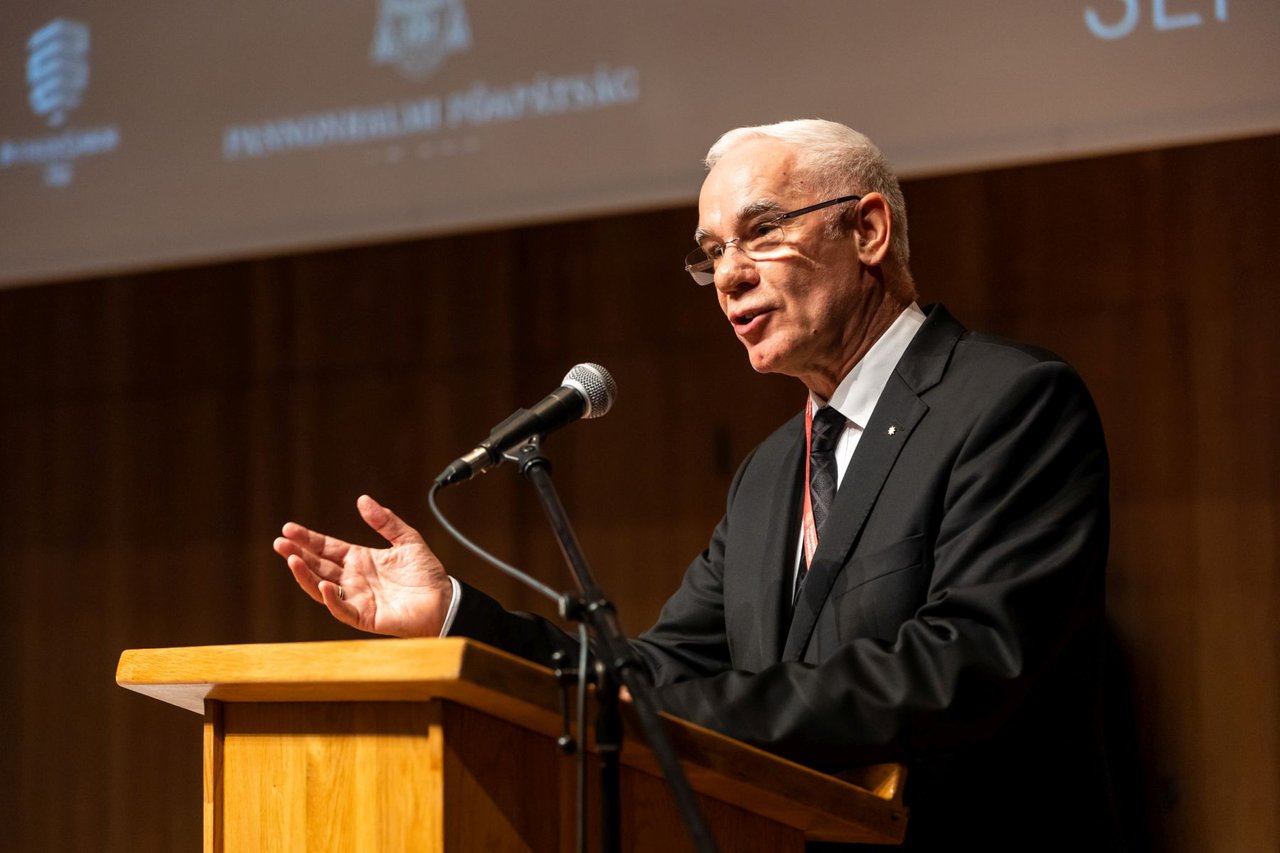
What we can give each other
Bishop Zoltán Balog, Ministerial President of the Synod of the Reformed Church in Hungary, also participated in the ecumenical conference in Pannonhalma, where, among others, the Ecumenical Patriarch Bartholomew I of Constantinople and Cardinal Antoine Kambanda of Rwanda spoke about the obstacles and importance of peace. We asked the Reformed Bishop of the Danubian Church District about the importance of unity efforts.
Why is it important for us Reformed to be present for such an occasion?
The relationship between the three branches of Christianity - Eastern Christianity, Roman Christianity in the West, and Protestantism - is very important for the peace and progress of the world. Patriarch Bartholomew I - who has been a very dear friend of mine for twenty years now - said that God's love manifests in local communities. It is not a matter of high church diplomacy, but the love of God is there, where faith is lived. There is a need for theological reflection on what it is that we can confess Jesus Christ together and what it is that we cannot yet confess. This coalesces in conferences like this. Jesus said to be one; what that means can be sought on such occasions. In the current situation of war, churches can play a very important role - even as an impediment, if they are engaged in war propaganda that alienates people from religion... And when it is over, hopefully in a positive way, when it comes to helping people find their voice of peace again. In a similar way to what Cardinal Antione Kambanda said about the resumption of peace after the massacres in Rwanda.
Can't we say that first, the East and West must reconcile their relationship, and then after, there will be time for us to reconcile with the Orthodox church?
At the time of the Reformation, the Orthodox even sought contact with Martin Luther, because they felt that this kind of revival of Christianity would bring them closer to the West, from which they were separated by a lot of power and faith issues. It is therefore a common task for all of us to walk the path of ecumenism. If we look at our brothers and sisters in Transylvania, they live together with the Romanian form of Orthodoxy, and there it is a daily question of what goes together and what does not. Therefore, there, for example, it is a matter of the flesh.
Last time we met here was Ash Wednesday. Do you like to come to Pannonhalma?
I've been coming to Pannonhalma for forty years, I have friends here - people with whom I can be in real community, and that's the most important thing - and I've learned a lot from Benedictine theology. I was the preacher of the ecumenical liturgy on Ash Wednesday. It's moving when we mutually confess our sins and warn each other of our fallibility, our sins, and the power of forgiveness. We say to each other, you are a sinner, repent: you are dust, you will turn to dust, but God's love embraces you! This is the message we can give to each other.